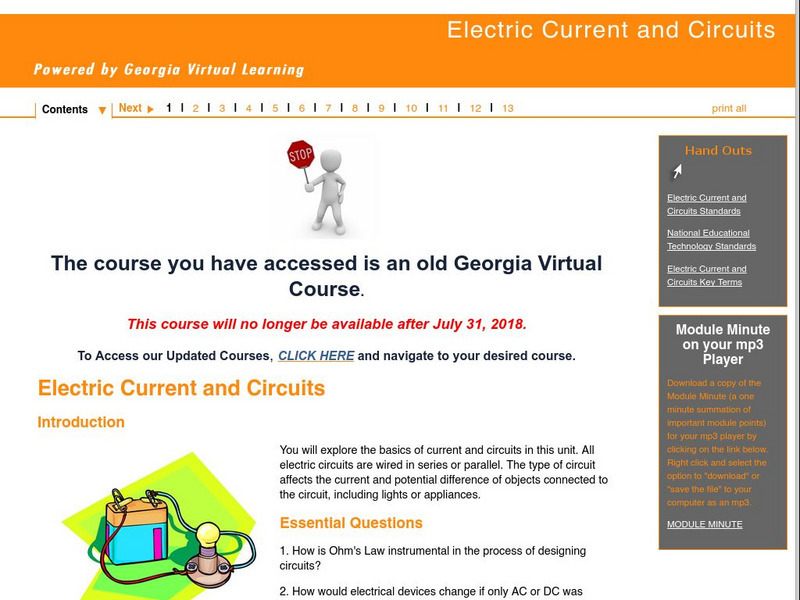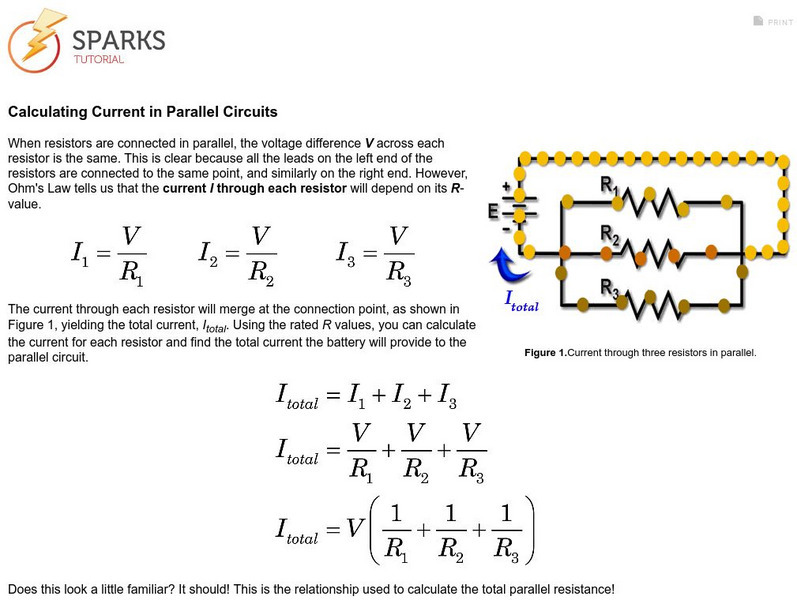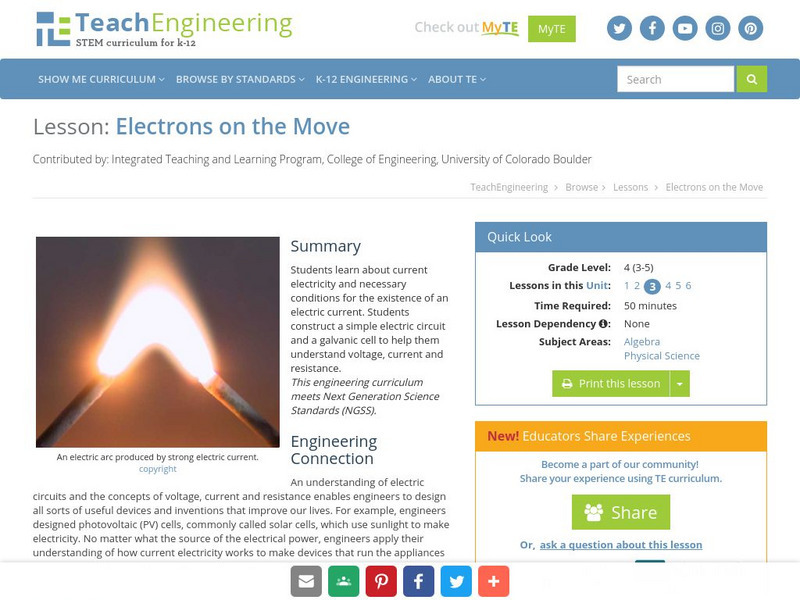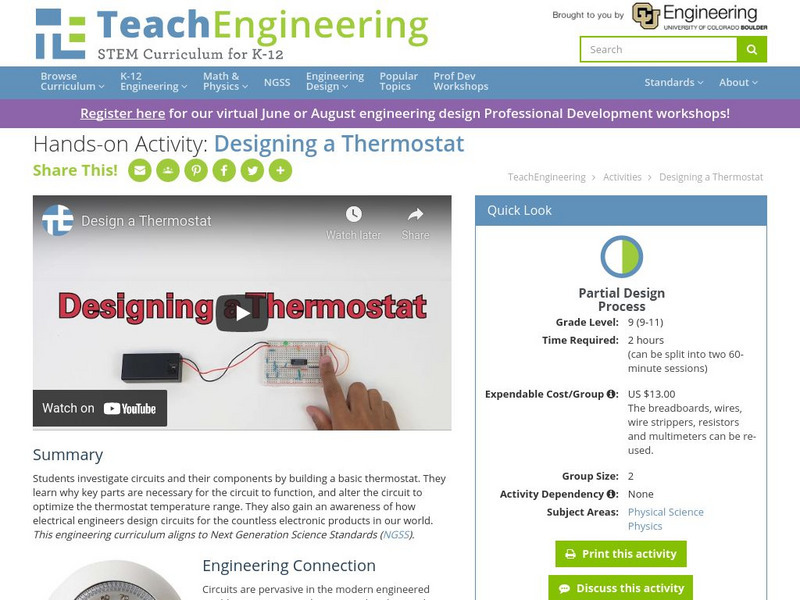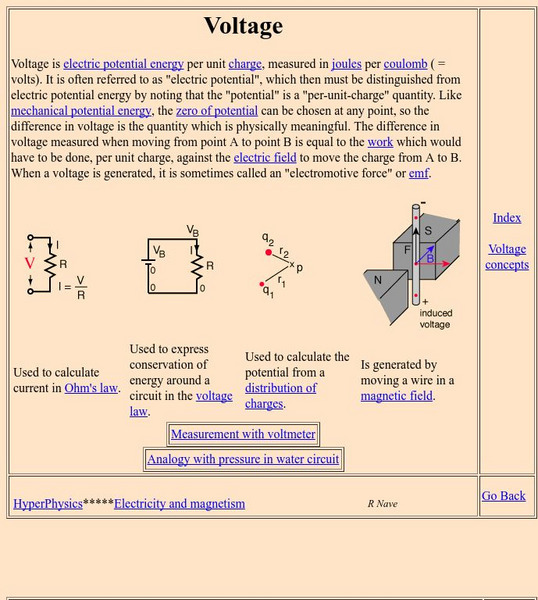Other
Easyphysics: Chapter 13 Current Electricity
Learners investigate current electricity. Some topics examined are voltage law, Ohm?s law, and electric resistance. The resource includes example problems with solutions and a chapter quiz.
Physics Classroom
The Physics Classroom: Current Electricity: Circuit Connections: Series Circuits
When two or more electrical devices in a circuit can be connected, it is considered a series connection or a parallel connection. When all the devices are connected using series connections, the circuit is referred to as a series...
Science and Mathematics Initiative for Learning Enhancement (SMILE)
Smile: Ohm's Law
For the teacher planning a lesson or for the student preparing for a project or presentation. This page describes a series of simple activities related to the voltage-current-resistance relationship.
Massachusetts Institute of Technology
Mit: Open Course Ware: Current, Resistance, and Power
Learners investigate current, resistance, and power. Some topics explored in the activities are Ohm's law, electrical power, and solving circuits. The resource consists of video clips, lecture notes, online textbook chapters, exam...
Physics Classroom
The Physics Classroom: Electric Circuits: Circuit Builder
Students manipulate this virtual electronic circuit board where they can add resistors, light bulbs, wires, and ammeters to build a circuit, explore Ohm's law, and compare and contrast series, parallel, and combination circuits. Three...
Georgia Department of Education
Ga Virtual Learning: Electric Current and Circuits
Students have the opportunity to explore the basics of current and circuits in this online module. Some of the activities include interactive animations, informational text, practice problems, and lab experiments.
Khan Academy
Khan Academy: Advanced Circuit Analysis
Practice analyzing circuits using Kirchhoff's laws and Ohm's law with series and parallel resistors.
Concord Consortium
Concord Consortium: Calculating Voltage in Series Circuits
See how Ohm's Law can tell us that the voltage across resistors will depend on that current value I and each R-value.
Concord Consortium
Concord Consortium: Calculating Current in Series Parallel Circuits
Use resistance formulas to determine the total resistances of the series and parallel parts. Then, use Ohm's Law to calculate the voltage drops across and currents through each part.
Concord Consortium
Concord Consortium: Calculating Voltage in Series Parallel Circuits
Use the series and parallel resistance formulas to determine the total resistances of the parts. Then, use Ohm's Law to calculate the voltage drops across each part.
Concord Consortium
Concord Consortium: Calculating Current in Parallel Circuits
Use Ohm's Law to calculate the current in parallel circuits.
Concord Consortium
Concord Consortium: Total Resistance for Resistors in Parallel
See how this application of Ohm's Law leads to a formula for the total of parallel resistances.
Science and Mathematics Initiative for Learning Enhancement (SMILE)
Smile: Electron Current Flow
A teacher lesson plan which could be easily converted into an idea for a student project or presentation. This page describes an activity in which the water-electricity analogy is used to investigate the relationship between current,...
TeachEngineering
Teach Engineering: Electrons on the Move
Students learn about current electricity and necessary conditions for the existence of an electric current. Students construct a simple electric circuit and a galvanic cell to help them understand voltage, current and resistance.
TeachEngineering
Teach Engineering: Completing the Circuit
In the everyday electrical devices we use - calculators, remote controls and cell phones - a voltage source such as a battery is required to close the circuit and operate the device. In this hands-on activity, students use a battery,...
TeachEngineering
Teach Engineering: Designing a Thermostat
Students investigate circuits and their components by building a basic thermostat. They learn why key parts are necessary for the circuit to function, and alter the circuit to optimize the thermostat temperature range. They also gain an...
Boston University
Elementary Physics: Current and Resistance
A general summary of electrical resistance including a comparison of AC and DC current.
TeachEngineering
Teach Engineering: Pointing at Maximum Power for Pv
Student teams measure voltage and current in order to determine the power output of a photovoltaic (PV) panel. They vary the resistance in a simple circuit connected to the panel to demonstrate the effects on voltage, current, and power...
Georgia State University
Georgia State University: Hyper Physics: Voltage
Electrical currents and voltage are defined and illustrated.
Learn AP Physics
Learn Ap Physics: Physics B: Circuits
A site dedicated to help students prepare for the AP Physics B test. This specific site reviews circuits including current, resistance, power, Ohm's law, batteries, DC circuits, transformers, and car coils. Site contains links to video...
Physics Classroom
The Physics Classroom: Power Revisited
This tutorial visits the concept of power. You will learn to develop new equations that express power in terms of current, electric potential difference and resistance.
CK-12 Foundation
Ck 12: Physics Simulation: Power Lines
[Free Registration/Login Required] Learn about the relationship between electric potential, current, and resistance in the context of high-voltage AC power lines using this interactive simulation. A PDF worksheet and a video tutorial are...
CK-12 Foundation
Ck 12: Physics Simulation: Marquee Lights
[Free Registration/Login Required] Learn about different ways you can wire an electric circuit, and how the brightness of the lights depends on how they are configured using this interactive simulation. A PDF worksheet and a video...
TeachEngineering
Teach Engineering: Hands on Activity: Designing a Thermostat
By building a basic thermostat, students will explore basic circuitry and electricity. The thermostat built out of a breadboard, temperature sensor chip, amplifier, and battery creates a linear relationship between temperature of the...






